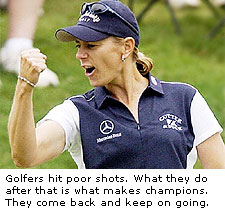How to be an imperfect winner on the golf course
Did you ever notice how many winning performances were imperfect performances? While amateurs and aspiring pros work diligently to be "perfect" in every way, the truth is that the performance of champions is generally NOT perfect.
Take a look at old tapes of golf's U.S. Open Championships, British Opens or the Masters Tournaments for example. You'll see shots flying all over the course. You'll see missed putts, drives landing off the fairways and approach shots going into bunkers and water.
Baseball players are considered a success when they get hits three out of 10 times at bat. Perfection? No. A .300 batting average is considered a lofty feat in baseball. Great pitchers don't throw perfectly all the time either. They can miss their targets, give up home runs and walk opposing batters and still win ball games!
Shaquille O'Neal and Tim Duncan, two of the NBA's best big men can't shoot free throws very well, they miss jump shots and throw poor passes at times, too! The best shooters in the league strive for a 50 percent shooting percentage from the field. Perfection? No.
The top tennis players in the world commit unforced errors and double faults during competition, and they still win. What is the point of all this? The point is that people who become winners do not do so because they've attained perfection. They become champions because they can work with imperfection better than others. Perfection is not the key to winning. Sure, players STRIVE for perfection, but it's working with the reality of imperfection that brings you to your better performances.
At times, golfers fall into the perfection "trap" when preparing for competition. They try to be so perfect in everything they do that they wind up trying too hard and scoring poorly. After a while, if they are smart, they realize that perfection is not the goal. Imperfect golfers playing imperfect rounds have won many championships. The key is being "perfect" within your "imperfection"!
Here are some important things to know about "imperfection" and "perfection" that can help you work with imperfection more effectively:
Perfectionism And Self-Sabotage
Have you ever tried to be perfect? What usually happens? This usually creates unnecessary tension and tightness, which in turn negatively affects your ability to play to your potential. Players who think about being perfect usually set themselves up for disappointment and failure because as soon as reality (imperfect shots and results) doesn't match the hope (being 100 percent perfect!), the player has set up a situation where a negative reaction will occur.
Getting Real

Being imperfect is more real than being perfect. Champions are not "afraid' of looking bad because they are too focused on the task at hand. It's the effort and commitment they make that pulls them through. Golfers hit poor shots, hockey players get knocked down, basketball players miss easy shots and so on. What they do AFTER that is what makes them champions. They come back and keep on going again and again and again!
Reduce Your Pressure
By accepting that you are imperfect, and that there will be imperfections in your performance, you will decrease the amount of self-induced pressure. Once you do this, you can play your OWN game the way you know how. Now you are fulfilling your obligation to express your talents to the fullest! (That means you will experience the good, the bad and the ugly at times!)
Accept The Paradox Of Imperfection
It's an interesting phenomenon that by accepting your imperfection, you actually begin to perform better. Why? Because simply by accepting imperfection, you immediately stop resisting what is real. Imperfection is real. You no longer fight the "invisible" battle that goes on inside yourself. When you accept this fact, you take the pressure off and free yourself up to perform at a higher level. Your energy is now funneled into doing what you know how to do and doing it to the best of your ability on that day. Handling imperfection perfectly, right?
Tolerate Your Errors
Being imperfect means that you can tolerate your own errors and mistakes. It doesn't mean that you like them or look forward to them, but it does mean that you tolerate them. When you tolerate them, you don't waste energy being angry and frustrated by them. Tolerating them means you acknowledge them and move on to refocus on the next moment that needs your attention.
Practice and strive for perfection knowing that accepting imperfection is the key to playing "full out" without fear and reservation. This is the paradox of perfection.
David Breslow is the author of "Wired To Win" and offers a highly acclaimed "Fulfilling Capacity And Excel Under Pressure" course to businesses as well as his "Perform In The FlowZone® Clinics" to diverse groups of athletes and businesses across the country. David has appeared on The Golf Channel, ESPN radio.
 By
By